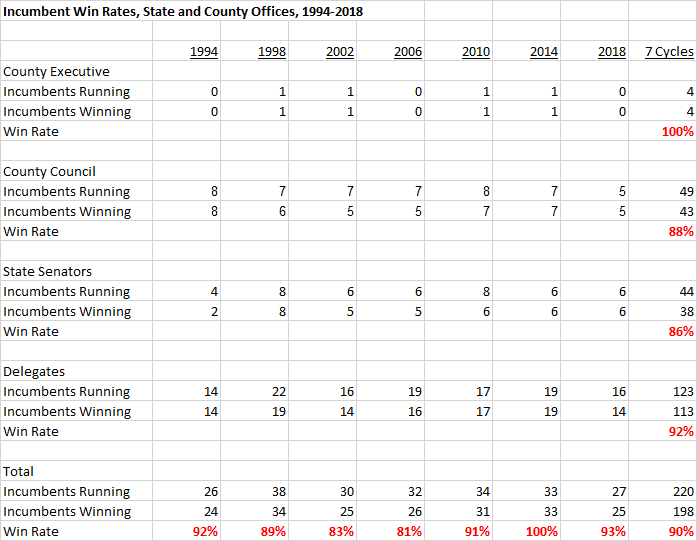By Adam Pagnucco.
Recently, Bethesda Beat kicked off the primary season with news that County Executive Marc Elrich and most of the county council are running for reelection. That’s not surprising and there will be plenty more news to come. But for the moment, let’s start with this general observation.
It’s hard to beat incumbents.
This may be the least surprising statement in all of politics, but it bears repeating for each new crop of candidates who come along. Opensecrets.org charts incumbent performance in Congress and finds their win rates generally in the 80-90% range for decades. And since the passing of President Franklin Delano Roosevelt, 8 of 12 U.S. presidents who ran for reelection won.
Montgomery County is no exception to this rule. The table below shows MoCo incumbent performance for county and state legislative offices over the last 7 cycles. During that period, MoCo incumbents won 90% of their reelections to their current seats. (The data does not show performance in runs for higher office.)

Incumbents might be getting stronger here over time. Over the last two cycles, only two incumbents – Delegates Marice Morales (D-19) and Shane Robinson (D-39) – lost reelection. Incumbent county council members and state senators won every reelection race in 2014 and 2018. As for county executive, incumbents have run for reelection seven times since the office was established in 1970. Only once, when five-term Council Member Neal Potter knocked off County Executive Sidney Kramer in 1990 with 52% of the vote, was an incumbent executive defeated.
Incumbents have so many advantages: money, relationships, knowledge of the job, policy and political experience, records of performance… it goes on and on. Rather than asking why they win, it’s more interesting to ask why they sometimes lose. I asked that question in a five-part series in 2010 that still holds up today. In MoCo, incumbents typically lose for one of four reasons: they are Republicans (not a factor today!), they get lazy and take their races for granted, they make too many enemies in their districts and – the rarest reason of all – they draw historically great challengers.
Back in 2010, I identified just four great challengers in recent years: Chris Van Hollen (who beat District 18 Senator Pat Sher in 1994 and longtime Congresswoman Connie Morella in 2002), Phil Andrews (who beat County Council Member Bill Hanna in 1998), Rob Garagiola (who beat District 15 Senator Jean Roesser in 2002) and Jamie Raskin (who beat District 20 Senator Ida Ruben in 2006). I will add Roger Manno to that list, who defeated District 19 State Senator Mike Lenett in one of the wildest MoCo races ever in 2010. If you include Congressional District 4, which once had part of east MoCo in it, then Donna Edwards deserves to be on the list for almost taking out Congressman Al Wynn in 2006 and then crushing him two years later.
Here is something I hear in every cycle. Politician X is a freshman incumbent who won his seat by a small margin last time. So inevitably X must be vulnerable in a reelection race, yeah? Actually, this is almost always WRONG. Let’s take District 5 Council Member Tom Hucker for example. A two-term delegate and founder of Progressive Maryland, Hucker won a surprisingly close race over civic activist Evan Glass and three other candidates by 222 votes in 2014. For the next four years, all I heard was “Hucker is vulnerable.”
Silly rabbits! Hucker is a pro. He knows the business. He hired good people, paid attention to constituent service, raised money, voted with his district and locked it down. In 2018, he won by 45 points because – among other things – he knows how to capitalize on being an incumbent. For those of you who think freshman Council Member Andrew Friedson is vulnerable just because he won 28% of the vote in his crowded first race, pay attention. Things tend to change when you’re an incumbent and you know how to be one.
Does this mean incumbents inevitably win? Certainly not – as the table above shows, they have lost 22 times in MoCo since 1994. But let’s be realistic: in MoCo, in Maryland, in the United States and probably in the rest of the Milky Way Galaxy, it’s hard to beat incumbents.
